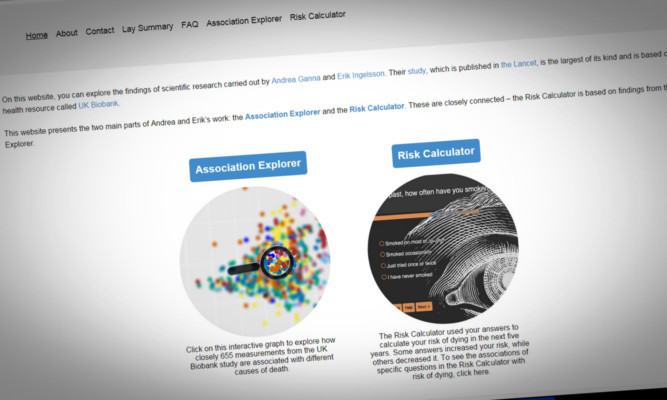Middle-aged adults will be able to glimpse their own mortality thanks to a new tool which claims to accurately predict an individual’s likelihood of death.
An online test for people aged between 40 and 70 uses a series of questions including walking speed and number of cars owned to judge their risk of dying in the next five years.
Self-assessment of health proved to be the most accurate indicator of how likely men were to die, whereas previous cancer diagnoses were the most accurate for women.
A smoking habit was also found to be the best way to judge whether someone will die, when disease and serious disease or disorder were excluded.
The test is based on research into half a million people conducted by two Swedish scientists, using more than 600 lifestyle variables to assess what can best predict mortality risk.
The findings were narrowed down to 11 lifestyle questions for men and 13 for women, with the researchers claiming it yields 80% prediction accuracy.
Dr Erik Ingelsson, who was involved in the study, said: “The fact that the score can be measured online in a brief questionnaire, without any need for lab tests or physical examination, is an exciting development.
“Of course, the score has a degree of uncertainty and shouldn’t be seen as a deterministic prediction.
It is hoped that the tool will raise awareness among the general public about their health, as well as being used to aid doctors and as a guide for public health policy.
Having answered the questionnaire, users are presented with a so-called Ubble age based on their answers a lower age than their own indicates good health, a higher one, less so.
This is accompanied by a risk of death expressed as a percentage, indicating how many people out of 100 of the same age and with similar answers will die in the next five years.
Dr Ingelsson added: “In general, if your Ubble age is higher than your actual age, it could raise concerns and provide some incentive for lifestyle change.
“Each question is representative of something the number of cars owned by someone is most likely a proxy for their social-economic group.
“Walking fast would not decrease your risk of dying, but if you are walking slowly it could be a predictor of bad health such as heart disease.”
Data for the project was taken from the UK Biobank, an online database of 500,000 people and their health conditions, in 2007, with 498,103 participants used for the study.
More than 8,500 had died by the time a follow-up was done five years later in 2012, and conclusions were drawn by comparing the risk profile of those who died with those who did not.
